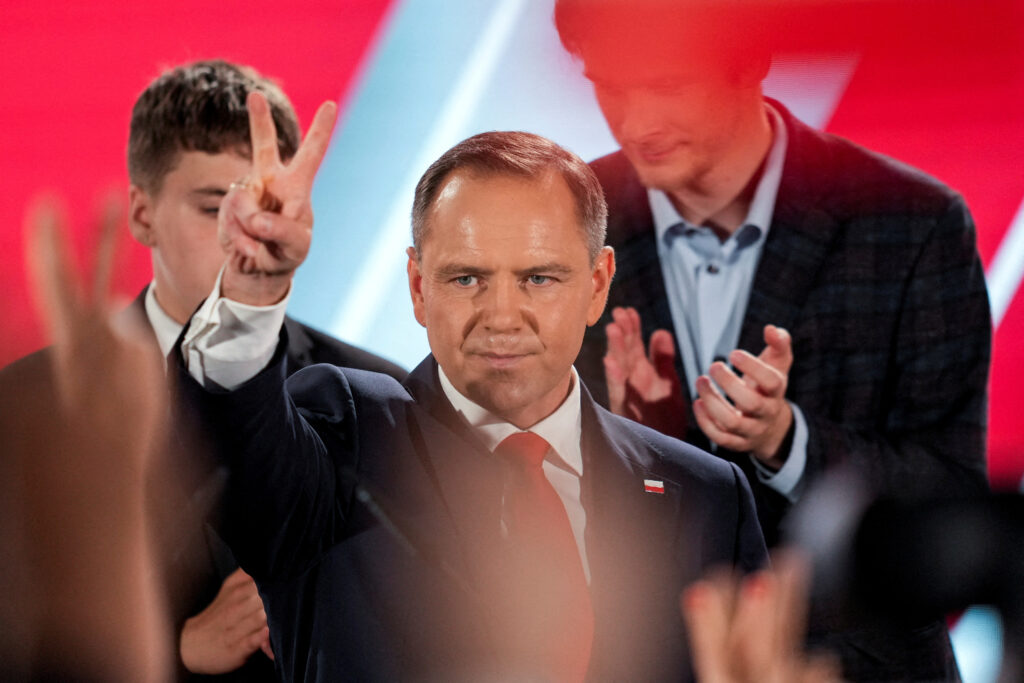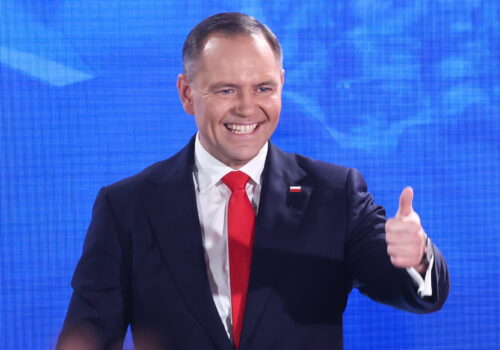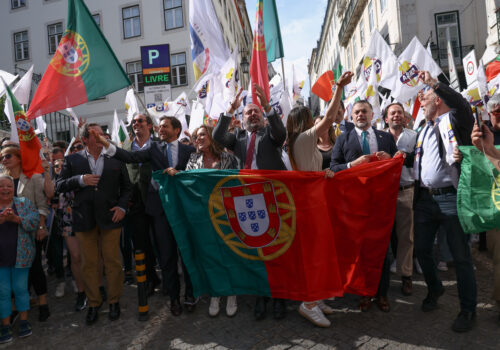For years, Europe’s democratic cohesion has depended on the relative predictability of its central and eastern states—Poland as the dependable heavyweight, Czechia as the technocratic moderate, and Romania as the reformist work in progress. But political foundations are now shifting. A trend that had seemed to be confined to two illiberal outliers—Hungary under Prime Minister Viktor Orbán and Slovakia under Prime Minister Robert Fico—is growing into a wider arc of populist, right-wing advance in the region and across the continent.
Recent European electoral results underscore the gravity of this shift. In a tight presidential race in July, Poland swung back to the conservative right, with the Law and Justice (PiS)–backed candidate Karol Nawrocki winning the presidency. Romania avoided a far-right presidency only narrowly in May. And in Czechia, populists are tightening their grip ahead of October’s parliamentary elections. Moreover, this pattern extends beyond Central and Eastern Europe (CEE), as recent elections in Germany and Portugal demonstrate.
As Europe’s political center frays and once-marginal parties reshape national agendas, the continent’s ability to govern effectively is at risk at a moment when external pressures demand strategic coherence. At home, populist victories threaten the European Union’s (EU’s) social cohesion and democratic values, including the rule of law. Internationally, far-right gains threaten Europe’s solidarity with Ukraine as it fights for its survival. Populist advances also risk hindering the military buildup necessary to deter mounting security threats to the continent should the United States disengage more from European affairs.
Election outcomes
Following elections earlier this year in Central and Eastern Europe (CEE), the mixed results reveal that the contest between liberal democracy and populism remains far from settled.
Some of the populist right’s successes can be ascribed to anti-incumbent sentiment. In Romania, for example, centrist opposition candidate Nicușor Dan defeated George Simion, a right-wing opposition candidate and Euroskeptic who opposes military aid to Ukraine. But the narrow presidential contest between these two “outsiders” exposes a deeper vulnerability. Simion’s party has emerged as Romania’s second-largest political force, commanding significant influence in a parliament in which far-right legislators occupy a third of the seats. Even more worryingly, the electoral process itself proved chaotic. Simion reached the runoff only after the original first round was annulled amid allegations of Russian interference. Though he conceded defeat, Simion simultaneously contested the results, claiming improper French and Moldovan meddling—charges Romania’s Constitutional Court unanimously dismissed. Dan’s triumph preserves Romania’s westward orientation and is an important reaffirmation of the rule of law and its Euro-Atlantic alignment. Even so, the thin margin of his victory and the turmoil surrounding the election demonstrate that Romania’s democratic institutions remain vulnerable to outside threats.
In Poland, right-wing presidential candidate Karol Nawrocki’s narrow win over centrist Rafał Trzaskowski shows right-wing populism’s staying power and may prove consequential for European stability. Trzaskowski, who was backed by the centrist Civic Coalition, led the first round with 31.4 percent but ultimately fell short, dealing a severe blow to Prime Minister Donald Tusk’s pro-EU government and to Warsaw’s unified voice on European and transatlantic affairs. While Polish presidents have a mostly ceremonial function, they can veto legislation. This power could affect the governing coalition’s hopes to reverse years of what it and its supporters see as institutional capture, court politicization, and the damage from PiS’s systematic assault on democratic norms—efforts that triggered multiple EU rule-of-law proceedings. Many Poles are now concerned that Nawrocki’s presidency could derail that restoration project, with implications that might extend far beyond Poland’s borders to the heart of European governance itself.
Turning westward, recent political developments provide little solace. Portugal’s early general election in May delivered another minority government, as well as unprecedented support for the populist party Chega (Enough) that added to both the preexisting political instability and Europe’s far-right drift. Chega ran on a populist platform of antiestablishment rhetoric and anxieties over immigration, garnering 22.6 percent of the vote and placing it alongside the historically dominant center-left Socialist Party.
Earlier this year in Germany, the right-wing, ultra-nationalist Alternative for Germany (AfD) party came in second in federal elections, doubling its vote share from four years prior. It was the strongest showing for a far-right German party since World War II. Despite being battered by scandals and intelligence scrutiny, the AfD has continued to poll strongly on the back of anti-immigrant, Euroskeptic messaging, particularly in the former East Germany, where the party has found a foothold among young, disillusioned voters.
The strategic stakes
This pattern of populist advances may soon extend to Prague. Czechia, which has anchored Central Europe’s pro-Western and pro-Ukraine coalition in recent years, appears headed for a populist shift in October’s general elections. Former Prime Minister Andrej Babiš’s ANO party leads polling, alongside the right-wing Freedom and Direct Democracy, which has built its platform on Euroskepticism, anti-immigration sentiment, and explicit opposition to military aid for Ukraine.
The rightward drift in Poland and Czechia carries outsized significance because Warsaw and Prague have punched above their weight in EU politics, bridging Western capitals with the more politically fluid EU eastern flank. Both countries have been vocal, generous supporters of Ukraine and have advocated closer European defense cooperation. A populist turn in Prague—alongside familiar foot-dragging on sanctions and dialed-down commitments from Bratislava and Budapest—could unravel that posture. It could feed broader regional and continental ambivalence toward Kyiv at a vulnerable moment, when the burden of sustaining Ukraine’s defense is falling more squarely on Brussels.
Also at stake are the EU’s nascent ambitions for a credible defense capability, since proposals for common rearmament programs and joint procurement depend on the very cohesion that Europe’s populists seek to undermine. The foreign policy challenge is nuanced: Polish and Romanian nationalists support robust defense spending at home but remain skeptical about pooled sovereignty within the EU. Yet without alignment on planning, procurement, and command structures, rising national defense budgets do little to strengthen Europe’s collective readiness. Meanwhile, Germany’s AfD opposes both domestic and EU military buildups. If every major defense initiative must first survive such centrifugal forces of domestic politics among the bloc’s twenty-seven members—some actively sympathetic to Moscow—the promises of united European defense look increasingly hollow. As with Italian Prime Minister Georgia Meloni, populists sometimes govern more pragmatically than they campaign. But whether these leaders would uphold Europe’s commitments to Ukraine and collective defense remains to be seen.
Institutional defenses: More than just elections
There are many factors that account for the recent success of populist parties, but these trends run deeper than electoral outcomes. They reflect domestic narratives that exploit grievance and mistrust, as much as a failure to counter foreign efforts to manipulate European electorates. Europe’s centrists must work to take back the language of sovereignty and security from those who wield it to divide voters, and they should do so before these messages harden into conventional wisdom under the combined weight of internal discontent and external interference.
In practice, this means connecting European cooperation to kitchen-table concerns and leaning into language an ordinary citizen can understand and appreciate. This entails stressing how coordinated defense procurement delivers better equipment at lower cost to national armies and how energy partnerships reduce household bills. It also requires emphasizing how European frameworks amplify—rather than diminish—national power by enabling small EU countries to negotiate with large ones as equals, allows states to secure better trade and investment deals that create jobs, and help deter Russian aggression through collective strength that no single nation could muster alone.
To better defend against foreign information interference, the EU should double down on auditing social media platforms and how their algorithms prioritize and distribute political content under the Digital Services Act. The EU should also enforce penalties and suspend service when platforms are shown to facilitate hostile influence operations.
Even then, the information landscape in an open Europe remains porous, and the institutional responses will lag multiple steps behind malicious campaigns. But such measures could meaningfully reduce their scale and effectiveness while signaling the EU’s resolve to tackle them as a continent-wide security imperative requiring a sustained response that could eventually tip the balance decisively in favor of democratic discourse. Given the stakes, both for the state of the EU’s democracies and the need for Europe to unite on rearmament to deter Russia, Brussels must act now to defend its institutions.
Soňa Muzikárová is a nonresident senior fellow at the Atlantic Council’s Europe Center.
Further reading
Mon, Jun 2, 2025
Experts react: Conservative Karol Nawrocki is Poland’s next president. What does it mean for Poland, Europe, and the world?
New Atlanticist By
On June 1, the historian and former boxer triumphed in Poland’s presidential election. Atlantic Council experts share their insights on the contest, the winner, and what’s next.
Tue, May 20, 2025
Portugal’s shift to the right is accelerating. What does that mean for its future?
New Atlanticist By Andrew Bernard
The center-right Democratic Alliance won the May 18 election, while the far-right Chega party continued its rise. With the main center-left party losing seats, there is now an absolute majority on the right.
Mon, May 19, 2025
Experts react: What message did Romanians send by electing Nicusor Dan?
New Atlanticist By
The mathematician and mayor of Bucharest came out ahead of his right-wing rival on May 18. Atlantic Council experts sum up the election results and the implications.
Image: Polish presidential candidate Karol Nawrocki, backed by the main opposition Law and Justice (PiS) party, reacts to the exit polls of the second round of the presidential election, in Warsaw, Poland, June 1, 2025. REUTERS/Aleksandra Szmigiel



